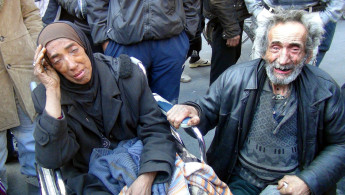'The earth is closing in on us': Palestinians continue to suffer in Syria's Yarmouk camp
'The earth is closing in on us': Palestinians continue to suffer in Syria's Yarmouk camp
The last residents in Yarmouk refugee camp still live under constant bombardment and are trapped in the fighting, unable to leave their homes with limited food and water.
3 min read
Yarmouk has been targeted by both the Syrian regime and militant groups (Getty)
As the battle between the Islamic State group and the Syrian regime continues in the Palestinian refugee camp of Yarmouk, outside Damascus, some residents remain trapped in the fighting, unwilling or unable to leave their homes.
"There is a military campaign to destroy the camp and those who remain in it," Palestinian refugee Farah al-Naji told The New Arab.
"Rockets are being thrown into the camp, houses are being destroyed and people are trapped under the rubble. They want to finish off the camp and take revenge on its inhabitants, but they do not allow us Palestinians to leave."
In a deal reached at the beginning of the month, fighters from the Hayat Tahrir al-Sham group were evacuated from Yarmouk in exchange for 5,000 residents from besieged rebel towns Fua Kafraya being allowed to leave.
It was the latest in a series of evacuation deals for areas surrounding the capital, Damascus, that came under intense military offensive and crippling sieges.
 |
Rockets are being thrown into the camp, houses are being destroyed and people are trapped under the rubble. They want to finish off the camp and take revenge on its inhabitants, but they do not allow us Palestinians to leave |  |
"Food is scarce, access to water is difficult and those who target the camp alongside the Syrian regime are also Palestinians," says Shadi Aqla, another camp resident who described the situation in Yarmouk camp as "catastrophic and tragic."
"The earth is closing on us, we do not know where to go. Women, children and the elderly are forced to work like men," Aqla said.
"We go out to the streets in the quiet moments of the bombardment in search of a safer cellar or place. "
Samar Qasem, who lost her husband last year, cannot leave the camp.
"People tried to flee the camp a few days ago to the settlement areas through the Babila checkpoint. We wait for a miracle, and the only thing we know is that they do not want anyone in the camp to survive. "
"We suffer from untold suffering; no one intervenes to help us, we wait for death at any moment. We do not know when this will come, but it is inevitable. Every day our places of escape shrink, and we may fall into the grip of the regime or the hands of [their Palestinian allies] like us."
 |
The breaks from the bombing are sometimes only a few minutes, but we always try to exploit them |  |
"The breaks from the bombing are sometimes only a few minutes, but we always try to exploit them," said Yusra Marwan, 40.
"Water is the biggest problem. We find it in cellars, or public water pipes revealed by bombs and missiles, but as we constantly need to move around we lose the places where we found the water, so we have to search for new sources, for example from puddles formed after the rain."
Meanwhile, the Palestine Liberation Organisation has been repeatedly criticised for failing to aid Palestinians in Syria, as they face sieges, regime bombardment and militant attacks in what many have called another Nakba.



